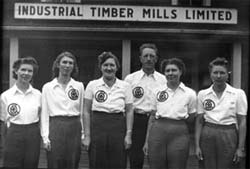The Communities : COMMUNITY LIFE : Women
Women have had an interesting perspective on logging because their lives are connected to the work in the woods, yet they are not as often out amongst the trees themselves. The stories of loggers and forestry life are often about men, for a number of reasons. The camps were mostly inhabited by men, and it was only after several decades of Cowichan Valley logging that women began to live in family quarters.
Women first began to work in the camps as kitchen help. They usually came in small groups of friends to do chores in camp like preparing and serving food. Whether or not women worked in camp was dependant upon the company, the location and the times. In the Industrial Timber Camp near Campbell River, north of Cowichan on Vancouver Island, women were working in the dining room as early as 1918. Women do not appear in Cowichan logging photographs until the 1930s.
The loggers sometimes used deprecating terms like "hen house" to refer to the women's quarters and others spent extra time preening and combing their hair when there was a chance that a woman might be around. The women of the logging camps worked hard and were expected to do their jobs just as the men were. Women made a great impact as teachers. At as young as 18, teachers would go out into the wilds of Cowichan to teach in small schoolhouses in the camps.
At Industrial Timber Mills Camp 6, Caycuse, the women were part of the First Aid team. In addition to tending to the inevitable injuries at the mill site, the team competed against other First Aid crews, taking second prize in the R.J. Filberg Cup event in Nanaimo, in 1943.
In the towns, women ran clubs and organizations such as the Imperial Order of the Daughters of the Empire, the I.O.D.E., founded at the beginning of the Second World War. Their original purpose was to contribute to the war effort through knitting and other activities, but after the war, they remained active in the community by teaching classes for new Canadians and awarding scholarships.
In the 1940s, women began to take on more roles as physical labourers in the logging industry. One job often taken by women was that of watching the fallers when they were out of sight from the rest of the side. Keeping tabs on the loggers was critical to their safety; if an accident occurred, they would need help as soon as possible. Today, women are engaged in the business, logging and milling aspects of the industry










